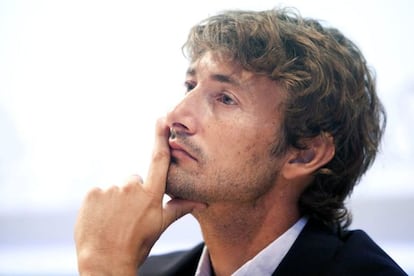Ferrero to retire after final fling
Former world number one to play for last time at home Valencia tournament

“The thing I am going to miss the most is competing. For us, competition is our bread and butter,” said Juan Carlos Ferrero on Wednesday after he announced that after next month’s Valencia Open 500 — which he co-owns with fellow player David Ferrer — he will quit playing professional tennis at the age of 32.
His home tournament will cap a career that has spanned 14 years, peaking in 2003 when he won the French Open crown, and beat Lleyton Hewitt and Andre Agassi — in the process taking the world number-one spot — en route to the US Open final where he was defeated by an up-and-coming Andy Roddick, who has also recently annouced his retirement from the professional game.
He was, in many people’s eyes, the hero of Spain’s first ever Davis Cup triumph in 2000, where they defeated Australia, winning both of his singles matches against Pat Rafter and Lleyton Hewitt to seal the title, whilst also being part of the 2004 team that regained the crown in Seville, partnering Tommy Robredo in the doubles.
One of only two Spaniards —- the other being Rafael Nadal — to reach the semifinals in each of his first four main-draw appearances at Roland Garros, he was widely seen as the natural sucessor to Gustavo Kuerten as the “King of Clay,” something which the Mallorcan has gone on to become.
It's going to leave a void that will be difficult to fill in my new life."
“It is going to leave a void that will be difficult to fill in this new life I’m going to have, but I've got some things in mind,” said Ferrero, who hails from the Valencian town of Ontinyent.
“The Mosquito,” as he is known, sees it as the perfect time to bow out, and said that he has “so many great memories” it is almost impossible to pick a favorite.
“The 2000 Davis Cup is unforgettable for all of Spain. I was very young and I have since realized bit by bit how important that win was, not only for me, but for the country as a whole. Winning a Grand Slam and reaching number one in the world are also things that you don’t forget and it really is impossible to choose the best moment.”
Injuries have, however, taken their toll on Ferrero’s body ever since that famous victory in Paris nine years ago, and he would rather think about all the things he has achieved, rather than think about what might have been. “Injuries have been a part of my career, yes, and obviously there were times when they prevented me from giving my all. But these things happen in a sportsman’s life, and you cannot control them.”
“This year has been difficult, [...] I haven’t had the continuity to do what I'd have liked to have been able to.”
He now looks forward to what he is calling a “new life” after tennis, which will involve running Equelite, his tennis academy in Alicante, the Valencia Open 500 and his own hotel. “In the academy there are players like Tita Torra who I will try to help and lend them the wisdom of my knowledge. I will help them get to the top.”
“He came to my academy when he was 10 years old,” said coach Antonio Martínez Cascales, talking about their 22 years together as “half a lifetime,” adding: “We knew that this moment was going to come, and it’s good he has played some matches this year. It’s just that the problems he has had have stopped him from doing what he wants to and being where he should have been.”
Despite only being the ninthhighest ranked Spanish male player, he sits a respectable 56 in the world, which is more of testament to the level of the competitors the nation has, including six in the world’s top 30, with Nadal and Ferrer both in the top five.
The 1993 Spain and World Junior champion in total played in 33 finals and won 15 titles in after turning professional in 1998, including the Monte Carlo and Rome Masters on his favored clay-court surface.
In the past decade only nine different men have won a Grand Slam event in what is regarded as one of the strongest ever eras in men’s tennis. Ferrer can always say he is one of them.
Tu suscripción se está usando en otro dispositivo
¿Quieres añadir otro usuario a tu suscripción?
Si continúas leyendo en este dispositivo, no se podrá leer en el otro.
FlechaTu suscripción se está usando en otro dispositivo y solo puedes acceder a EL PAÍS desde un dispositivo a la vez.
Si quieres compartir tu cuenta, cambia tu suscripción a la modalidad Premium, así podrás añadir otro usuario. Cada uno accederá con su propia cuenta de email, lo que os permitirá personalizar vuestra experiencia en EL PAÍS.
¿Tienes una suscripción de empresa? Accede aquí para contratar más cuentas.
En el caso de no saber quién está usando tu cuenta, te recomendamos cambiar tu contraseña aquí.
Si decides continuar compartiendo tu cuenta, este mensaje se mostrará en tu dispositivo y en el de la otra persona que está usando tu cuenta de forma indefinida, afectando a tu experiencia de lectura. Puedes consultar aquí los términos y condiciones de la suscripción digital.








































